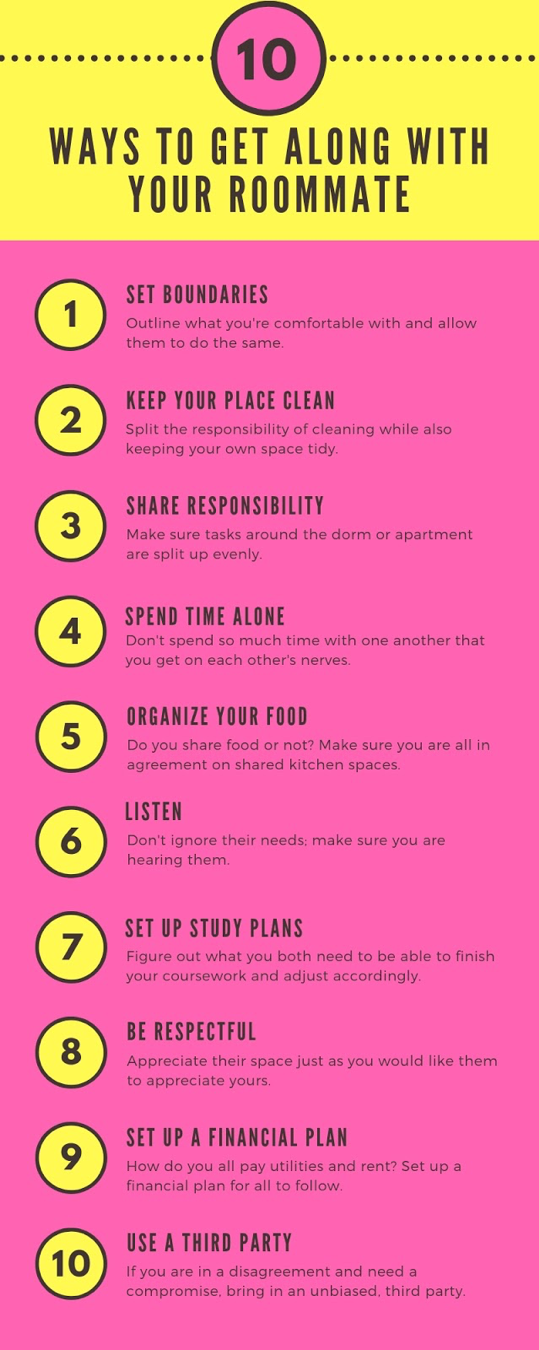Starting Off Right: How to Get Along with Your Roommate All Year
 When it comes to getting along with your roommate, the inevitable is true: you will have a disagreement with them at some point during the school year.
When it comes to getting along with your roommate, the inevitable is true: you will have a disagreement with them at some point during the school year.
For some, this is expected. For others, this comes as a shock. The truth is, when you move two people that don’t know each other well into the same room for an entire year, problems are likely to ensue, it’s just to what level.
Whether it’s an argument over an electric bill, a tiff over control of the TV or a situation in which one roommate feels smothered, these are all common occurrences that you can plan for and get ahead of, before they even happen.
So, in an effort to help you combat this issue and ensure you and your roommate get along all year through, here are ten methods to help you get along with your roommate all year.

1. Set Boundaries
First and foremost, it’s important that you immediately set boundaries with your new roommate. There are likely some things that you won’t put up with, as there are likely things on the other end that they won’t put up with.
Starting a conversation surrounding boundaries and what you feel is and isn’t acceptable will ensure that the two of you are working together and understand one another’s needs.
Without this initial conversation, arguments are likely to ensue. Remember that just because something is acceptable to you does not mean it’s acceptable to the other person and vice versa. Keep in mind there may be cultural differences, philosophical differences or simply differences of opinion as it relates to everyday occurrences.
So, before the issues begin, make sure that you set boundaries with the individual you’re going to be living with.
2. Keep Your Place Clean
The second most common reason for arguments with a roommate is cleanliness. Often, you’ll have two types of people: one that’s clean, and one that isn’t. And, more often than not, the two individuals will have clashing opinions on this topic.
As far as cleanliness is concerned, the answer is simple: keep your place clean. As far as methods go, make sure you outline those with your roommate upon moving in.
For instance, should you both be responsible for your own side of the room? Should you switch off responsibilities such as dusting and vacuuming? How often do you want to clean? Should you work together to clean once a week? If so, is there a specific day that works best for both of you that you should set aside? Who is responsible for cleaning when guests are going to stay?
While the idea of keeping your place clean can be a simple one, the methods behind it are not so simple. For this reason, speak with your roommate to answer these questions, determining the best method for both of you to move forward with.
Obviously, there will be some times in which you need to assess the situation on a case by case basis. However, outlining your cleaning initiatives before you even move in is the best way to ensure arguments are kept at a minimum.
3. Share Responsibility
In building upon the above example, it’s important that you and your roommate are sharing responsibility around the apartment or dorm room.
While cleaning is one of these elements that you should be concerned about, you should also think about other situations in which you and your roommate should be sharing responsibility. For instance, when thinking about cooking, are you both going to cook your own meals? Will you share meals and one person will cook them and you’ll switch off?
Outside of that, who is responsible for certain bills, or will you split all of those evenly? What is the likelihood that all roommates can be trusted to pay the bills on time? Is there an easier way to set up your billing?
Again, there are plenty of areas in which you can share responsibility with one another, it’s just a matter of having these conversations and setting up your process prior to any arguments.
4. Spend Time Alone
One of the biggest faux pas of a roommate relationship is wanting to spend a lot of time with your roommate. While this is entirely normal and expected, it can also become overwhelming and you can become annoyed with one another much more easily.
Basically, when you’re in close proximity to someone all the time, it starts to wear on both of you. For this reason, make sure that you are spending time alone as well (or with other friends).
When you get wrapped up in your roommate, it’s a good thing, but can play out negatively as well. This is why it’s important that you balance out your experiences with your roommate and ensure that you spend time together, but that you also spend enough time alone to make up for that.
5. Organize Your Food
Staying organized is never an easy task (unless you’re a bit of a neat freak, like me). However, when it comes to certain shared spaces, it’s important that you are always organized.
For instance, in regards to food, you’ll want to organize this in advance so you and your roommate get along much more easily. For instance, do you share food? If not, how will you separate it to ensure the other roommates don’t accidentally take your food?
Are there shared pots and pans? If so, who is responsible for washing them? Are there any kitchen items that aren’t shared amongst the roommates? What’s up for grabs versus what isn’t? How are you going to let everyone know?
Some roommates opt to share the kitchen space, meaning they take turns cooking for one another and share their groceries. Others buy and cook for themselves.
While either method can work, it's important that you set up those boundaries in advance, as arguments over stolen food and someone not cooking when they’re supposed to, or not washing a pot/pan in time, are not far behind if you don’t.
 6. Listen
6. Listen
Obviously, one of the most important things you can do when living with another person is to listen to them. What are their concerns? Is there anything that you can do to ease the living situation? What about the other way around?
Communication is key when it comes to living with another individual, which is why listening is so important in these situations. What are their needs? What are your needs? How can the two of you meet in the middle?
Is your roommate complaining about something repeatedly? If so, what are you doing to warrant these complaints?
On rare occasions, you will end up living with someone that you just aren’t compatible with. However, more often, roommates don’t get along because they don’t listen to and communicate with one another.
So, prior to going through awkward and painful conversations about switching roommates, try to communicate with one another and make sure you’re listening to one another’s needs.
7. Set Up Study Plans
Another common argument that roommates tend to have relates to studying. For most, the argument is surrounding the amount of noise in the apartment or dorm. For instance, if your roommate is watching TV and you’re trying to study, this could create an issue.
Or perhaps your roommate listens to music while they study but you can’t think when music is playing nearby.
Basically, the question becomes: how can the two of you coordinate your study times and habits to ensure everyone is happy.
For one, you’ll likely want to set up rules. For instance, if a roommate is watching TV, they’d like to do so on their television that they pay for. So if you need to study, you should either go into a separate room or, if that isn’t an option, visit the campus library or a classroom.
Conversely, if your roommate needs music to study and you don’t, they should put in headphones to accommodate your needs.
While these seem like petty arguments, they can turn into huge conflict, so it’s best to set up a solid plan regarding your study habits before you even need to have the argument. That way, everyone is happy and the terms are entirely fair.
8. Be Respectful
Living with a roommate isn’t easy, but you should always be respectful throughout your living situation.
While tensions can sometimes get high, you should always attempt to keep a level head, avoid saying things you don’t mean and, in situations where it’s necessary, walk away and only come back once you’ve cooled down.
There are lots of pain points in a living situation, so avoid these tense situations by being respectful at all times, and you’ll likely get the same treatment right back, ensuring there are minimal arguments between you and your roommate.
9. Set Up a Financial Plan
While it took a little while to get to this point, it’s a very important one. Financial arguments are a huge concern when living with another individual. For instance, who is going to set up the bills (such as water, gas and electric)? Are you going to split these down the middle? Does everyone want cable? If not, how do you plan on splitting that bill?
What is the process for paying your rent? Do you all need to combine finances or does your rental office allow you to pay your parts separately?
Essentially, when worrying about finances in a living situation, arguments are just around the corner. For this reason, get ahead of the arguments by setting up your payment plans well in advance, ensuring everyone is accountable for their own bills.
In addition, you’ll want to ensure you are both on the same page as far as heating and air conditioning. There are plenty of thermostat arguments to be had, so make sure you come up with a compromise that fits both of your needs before it escalates into a large issue.
10. Use a Third Party
Last, but definitely not least, when you are living with another person, there are bound to be arguments in which you don’t agree with one another at all. Rather than allowing an argument to escalate to this point, you should pull in a third party to give you an unbiased opinion.
While the need for this third party is likely to be slim, every once in a while, you may benefit from bringing in a third party to help you settle a disagreement, or even to set up a compromise that’s entirely unbiased.
You’ll want to choose someone that’s completely unbiased, so they can’t be closer with one of the two of you, and you’ll also want to ensure they have a full picture of your situation prior to making their judgment.
Again, living with a roommate that you just met (or even those that you have known for some time) is likely to turn into an argument at some point, whether you’re prepared for it or not. Whether big or small, these arguments can be detrimental to a relationship, which is why it’s so important to get ahead of them before they even begin.
So, in an effort to combat this issue ahead of time, take the above ten steps upon moving in with your roommate (and throughout the rest of the year) to get ahead of any larger, potential problems that may be lurking down the road.
While this isn’t an exhaustive list, this is a good place to begin your partnership for the next year, as it not only shows that you want the relationship to work, but it also allows your roommate to voice any concerns they may have, ensuring everything is discussed in advance, before it becomes a problem.
There are countless items that you can discuss with your new roommate, but as far as starting off right is concerned, the above ten steps are the best way to get along with your roommate all year long.
Interested in using our roommate matching formula to find the perfect college roommate for you? Create a profile & take the roommate quiz on Roomsurf! Get Started
